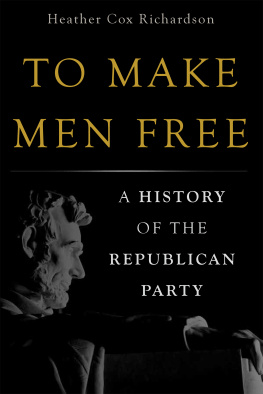ISBN: 978-0-8131-5117-5
Library of Congress Catalog Card Number: 76-190531
Copyright 1972 by The University Press of Kentucky
A statewide cooperative scholarly publishing agency
serving Berea College, Centre College of Kentucky,
Eastern Kentucky University, Kentucky Historical Society,
Kentucky State College, Morehead State University, Murray
State University, University of Kentucky, University of
Louisville, and Western Kentucky University.
Editorial and Sales Offices: Lexington, Kentucky 40506
Preface
I BEGAN THIS PROJECT hoping to trace the growth of the Republican and Federalist parties in Virginia. The finished product, however, is only in part a study of the development of the party system, for party machinery and partisan rhetoric constituted but one aspect of political life in the Old Dominion during the last decade of the eighteenth century. Coexisting with the new system of party politics was the old, oligarchic systemvividly described, but romanticized by Charles Sydnor in his small classic, Gentlemen Freeholdersbased on wealth, influence, and social prestige. Although the techniques of party organization and mass voter participation seem hardly compatible with the closed system usually associated with oligarchic control, the two systems rarely came into conflict. The men who ruled Virginiathe wealthy planters and lawyers who dominated the county courts, the members of the legislature, and the handful of men who served in the national governmentdiscovered ways to use the outward mechanisms of the new, partisan mode of politics while at the same time preserving traditional patterns of elite-dominated, deferential politics.
I hope therefore to tell two stories. On one level I will trace the emergence and development of Republican and Federalist party organizations in Virginia. It is here that the reader will find the details of the Virginia Antifederalists continuing hostility to the federal Constitution, of James Madisons switch from the Federalist to the emerging Republican party, of Madisons and Jeffersons attempts to coordinate Republican opposition to Federalist foreign policy, and finally, of the Republicans successful campaign in 1800 to replace President John Adams with a Virginian. This is an important story that deserves to be told. Yet the second storyan account of the continuing dominance of the old style of politics in Virginiais essential to understanding the first.
The opposition to the federal government, first from the Antifederalists and later from the Republican party, stemmed primarily from the desire of most members of Virginias political elite to preserve their political institutions, and their personal power, from the threat of a new, competing agency of government. Their system of decentralized, locally controlled government had, they believed, worked equitably and efficiently for the colony and later for the state. Moreover, it had insured them a dominant role in the affairs of the Old Dominion. And they had proved that they were prepared to defend that government against innovation. When Great Britain enacted a scheme of imperial reorganization that threatened to substitute royal for provincial authority in America, the members of Virginias provincial elite quickly assumed political and military leadership in the struggle that followed. The Revolution brought an end to British interference in Virginias internal affairs, but it did little to change the structure of provincial politics. If anything, the Revolution only strengthened the power of Virginias provincial ruling class.
The prerevolutionary elite maintained almost complete control over the Virginia Convention and framed a state constitution that retained most of the features conducive to oligarchic local control. Most of the reforms brought about by the Constitutionthe limitation of the governors powers and the provisions strengthening the lower house at the expense of the upper houseresulted not from any democratic impulse, but rather were caused by the reaction against the abuses of royal government and served only to increase the power of the small group of men who constituted the provincial elite.
It is not surprising that these same men viewed proposals for a new federal Constitution in 1788 with some misgiving. Although a slim majority in Virginia voted for ratification of the federal Constitution in June 1788, a large number of those delegates believed that substantive amendments would be added to prevent the new government from threatening Virginias interests. Accustomed to guiding their states destiny free from outside interference, the Antifederalists and many lukewarm Federalists remained hostile to any measure that might imperil the autonomy of the Old Dominion. This suspicion, far from disappearing after ratification, was heightened by subsequent Federalist policies. In the decade following ratification, more and more Virginians regretted that they had not heeded the advice of the Antifederalists.
The political leaders of the Old Dominion were accustomed to operating within a frame of reference that was peculiarly Virginian; their response to the policies of the new government was shaped by the interests and aspirations of their own localities and not by any broad conception of the national interest. Indeed, even purely local issues tended to be settled according to the narrow and particularistic interests of individual regions and counties. As a consequence, the numerous and often bitter divisions within the elite on issues of local concernsuch as those involving state banking, internal improvements, and compensation of slaveowners for executed slaveswere rarely translated into partisan gain for either national party.
I will discuss in detail those few local issues having a bearing on the debate on national questions, but I have left a thorough discussion of the other local issues to historians interested primarily in the economic and cultural structure of the state. This volume is principally concerned with the style of political life in Virginia and with the effect of that style on national party alignments. The mode of political conduct that I have discovered, while perhaps conducive to just and efficacious government in the more uncomplicated period of the seventeenth and early eighteenth centuries, proved to be increasingly self-indulgent and dysfunctional by 1800.
I have benefited from the counsel and criticism of many of my teachers and colleagues in the course of the research, writing, and revising of this work. William W. Abbot acted as a wise and patient teacher during the first stages of the study; Daniel J. Boorstin, who directed the dissertation on which this book is based, gave me the guidance and inspiration that could be expected from a man of his genius. John Hope Franklin and Lawrence W. Towner contributed not only their historical and editorial judgments but also a good measure of kindness and encouragement. Stephen Kurtz and Lee Benson read the manuscript at a later stage and offered helpful suggestions for revision. My colleague Richard S. Dunn gave me some much-needed encouragement and advice during a particularly crucial stage of the revision of the manuscript. James C. Curtis, my good friend, uncompromising critic, and mediocre tennis partner was a constant source of ideas and suggestions at virtually every stage of my work. Finally, I benefited from the painstaking editorial criticism of Robert Ferrell, chairman of the Frederick Jackson Turner Award committee.



![Jay John - The Federalist : a collection of essays, written in favour of the new Constitution, as agreed upon by the Federal Convention, September 17, 1787. : In two volumes. Vol. I[-II.]](/uploads/posts/book/76130/thumbs/jay-john-the-federalist-a-collection-of-essays.jpg)



